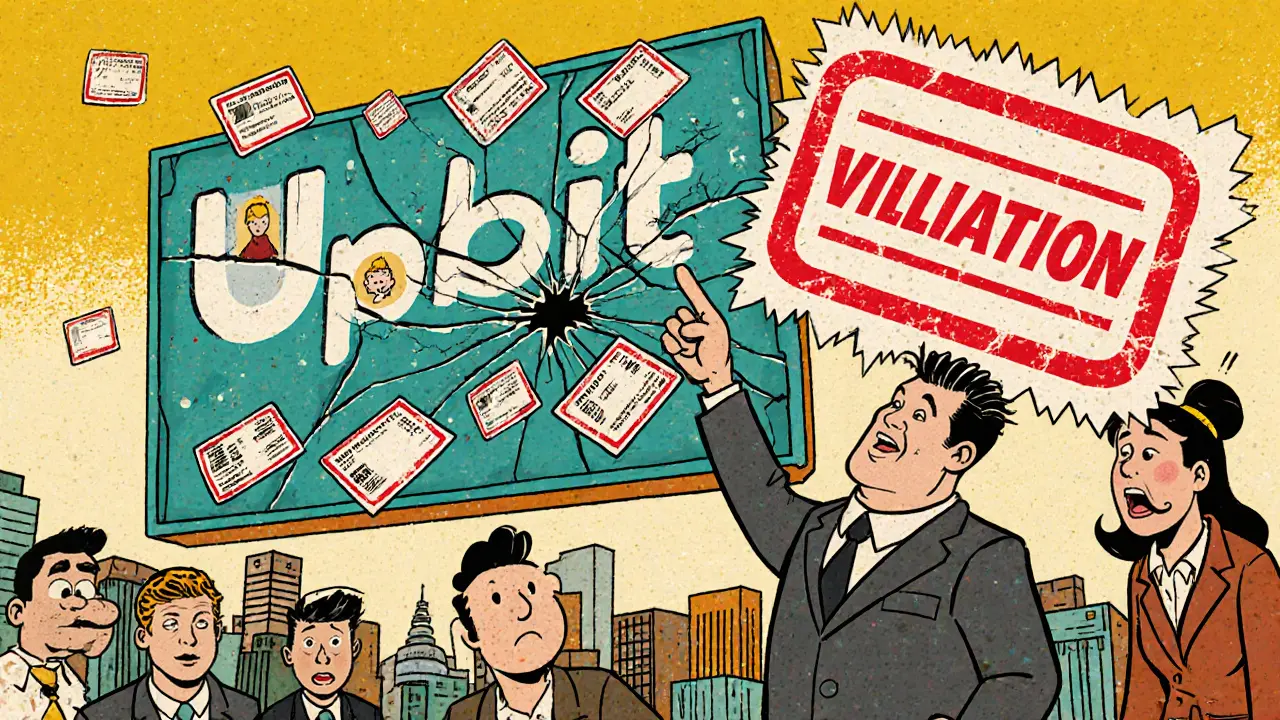KYC Violation Fine Calculator
Estimate potential regulatory penalties for KYC compliance failures in South Korea's crypto market based on the Upbit case.
Regulatory Context
South Korea's regulations allow up to 100 million KRW ($68,600) per KYC violation. While the maximum penalty is theoretically $34 billion, experts estimate actual fines will be significantly lower.
Based on the Upbit case, regulators typically apply a 20-30% multiplier of the maximum penalty for systemic failures.
When a single exchange has more than half a million failed identity checks, you’re not dealing with a glitch-you’re dealing with a system collapse. That’s exactly what happened at Upbit, South Korea’s biggest cryptocurrency exchange, when regulators uncovered over 500,000 violations of Know Your Customer (KYC) rules in late 2024. This wasn’t a few sloppy employees or a software bug. This was a systemic breakdown in one of the most heavily regulated crypto markets in the world.
What Exactly Went Wrong at Upbit?
Upbit handles over $8 billion in trades every day. It’s the go-to platform for millions of Korean crypto traders. But behind the scenes, the exchange was cutting corners on identity verification in ways that made it easy for criminals to slip through the cracks. The Financial Intelligence Unit (FIU) found that Upbit routinely accepted blurry, cropped, or photocopy-only ID documents. In nearly 190,000 cases, users submitted South Korean driving licenses-but Upbit didn’t check the encrypted serial numbers that are required by law to verify authenticity. They just looked at the name and photo. That’s like letting someone into a bank with a photo of a driver’s license they found online. Even worse: over 9 million accounts were created without any ID at all during re-verification cycles. These weren’t old accounts being updated-they were new users signing up, and Upbit let them trade without proving who they were. That’s not negligence. That’s a direct violation of South Korea’s Special Financial Transactions Act, which treats crypto exchanges like banks when it comes to anti-money laundering rules. And it didn’t stop there. Upbit also processed around 45,000 transactions with foreign exchanges that weren’t registered in South Korea. That’s a double violation: not only did they fail to verify their own users, but they also sent money to platforms that aren’t even legally allowed to operate in the country.Why This Is Bigger Than Just Upbit
This isn’t just a Korean problem. It’s a global wake-up call. Before this, the biggest crypto compliance case was Binance’s $4.3 billion settlement with U.S. regulators in 2023. But Binance’s violations were about failing to report suspicious activity and ignoring sanctions. Upbit’s case is different-it’s about not even trying to verify users in the first place. The number of violations here-500,000-is the largest single KYC failure ever recorded in crypto history. South Korea’s regulators didn’t just slap a fine and move on. They proposed a six-month suspension of new user registrations. That’s a massive blow to a platform that grows by adding new traders every day. But they didn’t shut it down completely. Why? Because Upbit controls about 80% of South Korea’s crypto trading volume. If they shut it off, millions of people would lose access to their funds overnight. So regulators chose a middle path: stop growth, fix the system, and keep existing users trading. This is a new model for crypto enforcement. Other countries have either gone all-in (like China’s ban) or been too slow to act (like some U.S. states). South Korea is showing that you can regulate without destroying the market. But only if you’re willing to audit deeply and punish seriously.
How Exchanges Are Changing After This
Since the investigation came to light, every crypto exchange in South Korea has scrambled to upgrade its KYC systems. Bithumb, Korbit, and Gopax-all smaller than Upbit-have rolled out new document verification tools that check for watermarks, holograms, and encrypted serial numbers in real time. Some are even using AI to detect fake IDs by analyzing lighting, shadows, and font inconsistencies in uploaded photos. Compliance costs are skyrocketing. Exchanges are hiring full-time KYC teams, not just outsourcing to third-party vendors. They’re now required to keep digital records of every user’s ID for at least five years, and regulators can demand access to any account’s entire history during a license renewal audit. The timeline for renewal has also changed. Before, exchanges got a three-year license with a quick paperwork check. Now, regulators dig through millions of transaction logs and account onboarding records. If you’ve got even one suspicious pattern-like a user registering with the same ID across five different accounts-you’re flagged.What This Means for Traders
If you’re a Korean crypto user, your experience has changed. You can’t sign up for Upbit right now. You can still trade if you already have an account, but you can’t open a new one. Many traders have switched to Bithumb or international platforms like Kraken and Coinbase, even though those require more documentation and longer verification times. Reddit threads in r/KoreaCrypto are full of people complaining about delays. But there’s also a growing number of users saying, “Good. I want to know my exchange isn’t letting criminals use my money.” Outside Korea, traders are watching closely. If Upbit gets fined heavily and survives, other countries might copy South Korea’s approach. If Upbit gets wiped out, regulators elsewhere might go harder on exchanges they see as too big to fail.
The Legal Battle and What’s Next
Upbit’s parent company, Dunamu, didn’t just accept the findings. They filed a lawsuit in January 2025 to challenge the suspension. Their argument? That the FIU’s audit methods were flawed and that some of the “violations” were technical errors, not intentional fraud. But regulators aren’t backing down. They say the pattern is too consistent to be accidental. Over 9 million accounts with no ID? That’s not a glitch. That’s a policy. The final decision was expected on January 21, 2025. As of now, Upbit is still operating under the suspension notice, with no new users allowed. The fine, if any, hasn’t been finalized-but experts say it won’t reach the theoretical $34 billion maximum (which would be $68,600 per violation). Realistically, it’ll be in the hundreds of millions of won, with a requirement to overhaul their entire compliance system.What This Teaches the Global Crypto Industry
The Upbit case proves one thing: if you’re running a crypto exchange in a country with real regulations, KYC isn’t a checkbox. It’s the foundation. You can’t automate your way out of compliance. You can’t outsource it to a vendor that doesn’t understand local ID laws. You can’t ignore documentation because “users are frustrated.” South Korea didn’t ban crypto. They didn’t shut down the biggest exchange. They forced it to fix its house. And now, every other exchange in Asia, Europe, and even the U.S. is looking at their own KYC logs and asking: “Are we just as bad?” This isn’t just about Upbit. It’s about what happens when a market grows too fast and regulation finally catches up. The lesson? Build your compliance into your code-not your budget.What is Upbit and why does it matter?
Upbit is South Korea’s largest cryptocurrency exchange, operated by Dunamu. It handles about 80% of the country’s crypto trading volume-over $8 billion daily as of early 2025. Because of its size, its compliance failures affected millions of users and exposed systemic weaknesses in how crypto exchanges verify identities in regulated markets.
How many KYC violations did Upbit have?
Regulators found over 500,000 confirmed KYC violations, including cases where users submitted fake or unclear IDs, driving licenses without serial number verification, and over 9 million accounts created without any identification documents at all.
What penalties did Upbit face?
The Financial Services Commission proposed a six-month suspension of new user registrations and is negotiating a financial penalty. While the law allows up to 100 million Korean won ($68,600) per violation, the final fine is expected to be significantly lower, likely in the hundreds of millions of won, with mandatory system upgrades required.
Can I still use Upbit right now?
Yes, if you already had an account before the suspension. Existing users can still trade and withdraw funds. But no new users can register, and the platform is under strict regulatory monitoring while it fixes its compliance systems.
Why didn’t South Korea shut down Upbit completely?
Upbit controls 80% of South Korea’s crypto market. Shutting it down entirely would have caused massive disruption for millions of users, potentially triggering panic selling and fund freezes. Regulators chose to restrict growth (no new users) while allowing existing users to continue trading, giving Upbit time to fix its systems without collapsing the market.
Is this case unique, or will other exchanges face similar audits?
This is a precedent. Other countries, including Japan, Singapore, and even parts of the U.S., are now reviewing their own crypto exchange audits with the same level of scrutiny. The Upbit case showed regulators that deep, historical audits can uncover massive systemic failures-not just isolated mistakes. Expect more exchanges worldwide to face similar reviews during license renewals.

Arthur Crone
November 11, 2025 AT 12:38Upbit didn't fail KYC they failed basic logic. 9 million unverified accounts? That's not incompetence that's corporate malice. You don't accidentally miss 500k verifications. You do it because profits > compliance. End of story.
Rachel Everson
November 13, 2025 AT 10:25This is actually kind of inspiring. Most places would've just banned crypto or let it run wild. South Korea said 'fix it or we pause you' and kept the market alive. That's smart regulation.
Ashley Mona
November 14, 2025 AT 06:55AI detecting fake IDs by analyzing shadows and font inconsistencies?? That's wild. I'd love to see a breakdown of how that works. The tech is getting scary good.
Wayne Dave Arceo
November 14, 2025 AT 12:11Let me get this straight. A Korean exchange lets people use photocopies of driver's licenses as ID and you're shocked? In the US we'd have called this a federal crime before breakfast. This is why I hate how lax Asia is about financial oversight. You think this is unique? It's just the tip of the iceberg.
Adrian Bailey
November 14, 2025 AT 16:56Man I just checked my Upbit account and still can trade but no new signups. Kinda weird but honestly I'm cool with it. I'd rather wait 6 months than have my money going to some ghost account with a fake ID. Plus now Bithumb's verification is actually kinda fast. Took me 12 mins. Used to be 3 days.
dhirendra pratap singh
November 14, 2025 AT 18:10THIS IS WHY WE CAN'T HAVE NICE THINGS. Upbit is a SCAM. They knew. They all knew. And now they're pretending it's just a 'technical error'? I'm telling you - if this was a US exchange they'd be in federal prison by now. But nope. Korea lets them off with a slap. Pathetic.
tom west
November 16, 2025 AT 12:35Let's be real. The $34B maximum fine is a joke. That's 100 million KRW per violation. 500k violations = 50 trillion KRW. That's more than South Korea's entire 2024 budget. The regulators aren't going to kill the goose that lays the golden egg. The real fine will be 100 million KRW. Maybe 200. And they'll get a pass because they're 'too big to fail'. Classic.
Rebecca Saffle
November 16, 2025 AT 23:29People are saying 'good they're finally fixing this' but what about the users who got locked out? Who's helping them recover funds if their account gets flagged during the audit? No one talks about that. This isn't justice. It's bureaucratic violence.
Michael Heitzer
November 17, 2025 AT 07:00This is the future of crypto regulation. Not bans. Not chaos. Not Silicon Valley's 'move fast and break things' nonsense. It's deep audits. Real accountability. Systems that check watermarks and holograms. You can't automate compliance. You have to engineer it into the DNA of your platform. Upbit didn't just break rules - they broke trust. And trust? You can't code that back.
BRYAN CHAGUA
November 17, 2025 AT 20:36It's fascinating how this mirrors the banking crisis of 2008. Back then, banks ignored mortgage verification because 'everyone was doing it'. Now crypto exchanges ignored KYC because 'users wanted speed'. Same pattern. Same arrogance. The difference? This time, regulators showed up early. Maybe we're learning.
Debraj Dutta
November 19, 2025 AT 13:06Interesting that Japan and Singapore are watching closely. I wonder if they'll adopt the same suspension model or go harder. In India, we're still debating whether to allow crypto at all. Maybe we should skip the chaos and just copy Korea's middle path.
Laura Hall
November 19, 2025 AT 19:15It's important to recognize that the users aren't the villains here. Many of them were unaware that their IDs weren't being properly verified. The responsibility lies squarely with Dunamu's leadership and their compliance team. The traders who just want to invest shouldn't be punished for corporate negligence. Let's not confuse the victims with the perpetrators.
Johanna Lesmayoux lamare
November 20, 2025 AT 19:45They’re still operating. That’s the real story.
Edward Phuakwatana
November 21, 2025 AT 16:21Imagine if every crypto platform had to pass a 5-year forensic audit just to renew their license. This is the new gold standard. No more outsourcing to shady vendors. No more 'we didn't know'. Real-time AI checks. Immutable logs. Mandatory internal compliance officers. This isn't regulation - it's evolution.
Arthur Coddington
November 23, 2025 AT 11:36So let me get this straight - the biggest exchange in Korea gets caught with 9 million unverified accounts, and the punishment is a 6-month freeze on new users? Meanwhile, the CEO probably just got a bonus. This isn't justice. It's theater. They're just buying time until the public forgets.
Kristin LeGard
November 24, 2025 AT 04:52Why are we even surprised? This is what happens when you let a company grow faster than your laws. Upbit didn't break the rules - they outgrew them. Now the regulators are scrambling to catch up. Classic.
ty ty
November 26, 2025 AT 03:29So you're telling me a company with 80% market share gets to keep operating after 500k violations? Wow. I guess 'too big to fail' applies to crypto now. Next they'll be bailed out with taxpayer money. Just like the banks. Real inspiring.
Joanne Lee
November 27, 2025 AT 22:24The fact that regulators chose to suspend new registrations rather than shut down operations entirely suggests a nuanced understanding of systemic risk. This isn't punitive - it's structural. It gives time for remediation without destabilizing the market. A rare example of regulatory wisdom.
Suhail Kashmiri
November 28, 2025 AT 05:11lol 500k violations? Bro they just didn't wanna check IDs. That's it. People want to trade. They don't wanna send passport pics. Upbit gave them what they wanted. Now the government is mad because they lost control. Classic. Let the people trade.